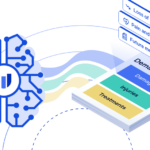
CES 2024: Unveiling The Future Of Legal Through Consumer Innovations

(Photo by PATRICK T. FALLON/AFP via Getty Images)
One of the great things about CES is the Consumer Technology Association’s opening media presentation on tech trends. While these trends primarily focus on consumer technology, their ripple effects on the legal industry are real. The technology with some of the most significant impacts on legal has in fact been that which lawyers, as consumers, adopt and begin to use in their work. Smartphones. Laptops. Google. Even Gen AI.
googletag.cmd.push( function() { // Display ad. googletag.display( "div-id-for-top-300x250" ); });The presentation is always on the first media day of CES. This year, the presentation was given by Jessica Boothe, the CTA Director of Research, and Brian Comiskey, the resident futurist at CTA. Unlike years past, when the presentation was pretty substantive, this year’s presentation was more of a puff piece for the show itself. Nevertheless, there were some trends discussed that may impact the legal marketplace.
 Sponsored How 160 Legal Tech Decision-Makers Are Combating Cybersecurity Threats Do law firms recognize the gravity of the challenges they’re facing? From Arctic Wolf and Above The Law
Sponsored How 160 Legal Tech Decision-Makers Are Combating Cybersecurity Threats Do law firms recognize the gravity of the challenges they’re facing? From Arctic Wolf and Above The Law Gen Z’s Rising Influence
Boothe and Comiskey say we are on the cusp of a generational sea change. The number of Gen Zs, people between 11 and 26 years old, is growing exponentially. It will soon be upwards of a quarter of the world’s population. And 86% of the Gen Z people CTA surveyed say technology is essential to their lives. Their tech-centric lifestyle is shaping the future.
googletag.cmd.push( function() { // Display ad. googletag.display( "div-id-for-middle-300x250" ); }); googletag.cmd.push( function() { // Display ad. googletag.display( "div-id-for-storycontent-440x100" ); }); googletag.cmd.push( function() { // Display ad. googletag.display( "div-id-for-in-story-youtube-1x1" ); });This growing dominance of Gen Z is a change that legal can ill afford to overlook. The truth is that more and more Gen Zs will be on juries, will become judges, will be working for lawyers’ clients and will be in decision making roles.
Yet, many lawyers communicating with the Gen Zs are older. They have different attitudes toward technology and how to use it to persuade. To effectively persuade and communicate with Gen Z, legal must recognize the changes that are coming and understand and adapt to Gen Zs’ technological preferences and expectations.
Sponsored Sponsored Introducing Lexis® Create – enhanced with Lexis+ AI The only fully integrated legal drafting solution. Lexis Create integrates Practical Guidance, Market Standards, Shepard's, AI-Powered Clause Intelligence, recommendations, and collaboration into drafting. From LexisNexis
Sponsored Introducing Lexis® Create – enhanced with Lexis+ AI The only fully integrated legal drafting solution. Lexis Create integrates Practical Guidance, Market Standards, Shepard's, AI-Powered Clause Intelligence, recommendations, and collaboration into drafting. From LexisNexis  Sponsored InterAction+ Brings Power Of CRM Software To Law Firms Of All Sizes The only legal CRM with exclusive content from LexisNexis®. From LexisNexis® InterAction+™
Sponsored InterAction+ Brings Power Of CRM Software To Law Firms Of All Sizes The only legal CRM with exclusive content from LexisNexis®. From LexisNexis® InterAction+™  Sponsored How to Achieve Quicker, More Valuable Case Settlements with Minimal Effort: A Guide for Personal Injury Lawyers We’re pleased to share the “Top 5 Things Carriers Are Looking for in Demands” — a guide authored by a lawyer with deep experience on… From EvenUp and Above The Law
Sponsored How to Achieve Quicker, More Valuable Case Settlements with Minimal Effort: A Guide for Personal Injury Lawyers We’re pleased to share the “Top 5 Things Carriers Are Looking for in Demands” — a guide authored by a lawyer with deep experience on… From EvenUp and Above The Law  Sponsored Introducing Lexis® Create – enhanced with Lexis+ AI The only fully integrated legal drafting solution. Lexis Create integrates Practical Guidance, Market Standards, Shepard's, AI-Powered Clause Intelligence, recommendations, and collaboration into drafting. From LexisNexis
Sponsored Introducing Lexis® Create – enhanced with Lexis+ AI The only fully integrated legal drafting solution. Lexis Create integrates Practical Guidance, Market Standards, Shepard's, AI-Powered Clause Intelligence, recommendations, and collaboration into drafting. From LexisNexis Increased Connectivity
Boothe and Comiskey cited statistics confirming a dramatic increase in connectivity, particularly in emerging markets. 5.4 million people are connected to the internet today, with 1 billion more by 2027.
This dramatic rise in connectivity will continue to reshape how people access and process information. More and more people will get their information from online sources. More and more people will learn by watching YouTube and videos. The legal profession must evolve its persuasion tools and techniques, transitioning from traditional paper-based methods (paper and quill) to more digital platforms.
googletag.cmd.push( function() { // Display ad. googletag.display( "div-id-for-bottom-300x250" ); });Increased Acceptance of AI
According to survey results by Booth and Comiskey, most adults say they are familiar with AI and have a favorable view of it. They believe it to be innovative, futuristic, and intelligent. They are less concerned about unpredictability and more about privacy and the loss of jobs.
Sponsored Sponsored How 160 Legal Tech Decision-Makers Are Combating Cybersecurity Threats Do law firms recognize the gravity of the challenges they’re facing? From Arctic Wolf and Above The Law
Sponsored How 160 Legal Tech Decision-Makers Are Combating Cybersecurity Threats Do law firms recognize the gravity of the challenges they’re facing? From Arctic Wolf and Above The Law  Sponsored How Generative AI Is Disrupting Law Firm Billing Practices Amid legal landscape shifts, billing practices remain vital. With generative AI enabling faster, more efficient work, some law firms may adjust billing models accordingly. From LexisNexis
Sponsored How Generative AI Is Disrupting Law Firm Billing Practices Amid legal landscape shifts, billing practices remain vital. With generative AI enabling faster, more efficient work, some law firms may adjust billing models accordingly. From LexisNexis What does this mean for lawyers? We can’t ignore the fact that people will expect legal to use AI to improve what lawyers do. To make the experience of hiring and working with lawyers more frictionless.
Boothe and Comiskey predict that in the future, Gen AI will power chatbots that can be used in kiosks, cars, homes, and even offices. If a chatbot running AI can handle a retail transaction (some already can), clients will demand the same frictionless experience for interactions with their lawyers. For years, lawyers have either ignored or poo-pooed the need to use technology to improve client experience under the theory that clients don’t want it. That’s not true anymore, if it ever was.
Boothe also pointed out the health challenges due to cost, the need to prioritize other things over health, and limited appointments and doctor office hours. Boothe says AI and Gen AI offer significant opportunities to meet these challenges. Those seeking legal help face these same challenges — which is why we continue to have such an access to justice problem. AI and Gen AI products could better meet these challenges and open up markets for lawyers.
AI Acceptance: A New Frontier
As I watched Boothe and Comiskey’s presentation, it dawned on me that while there were several references to AI and Gen AI, there were fewer than I expected.
Boothe and Comiskey, focused not so much on what AI and Gen AI could do in the abstract but on practical applications. This stands to reason: Consumers really don’t care how a product works. What they care about is what it can do.
This consumer-centric approach, emphasizing product functionality over technological specifics, offers a valuable lesson for legal. Legal tech has been more focused during the past year on Gen AI itself rather than trying to create products that use Gen AI to solve pain points. Unfortunately, lawyers and law firms, in the rush to say they are using Gen AI, haven’t really cared so much about what the products enabled by the technology could do for them.
We could all do with a step back and a refocus on why we want technology. A focus on what job we want technology to do for us instead of blabbering on about the technology itself.
The Emerging Role of Smart TVs
Boothe and Comiskey claim that our TVs will become even smarter and better connected to the web and the internet. Our TVs will become an intelligent center for a variety of applications powered through our smartphone. TVs will be able to direct things like appliances and security cameras. Perhaps even more importantly, our TVs can become e-commerce centers, allowing us to speak with them and conduct business.
I saw this concept expressed in some CES press briefings by TV suppliers like LG and Panasonic. According to LG, some 74% of consumers have access to web connectivity through their TV. This connectivity enables the use of all sorts of apps and tools that once were only accessible with a desktop, laptop, or smart device. LG also announced a collaboration with Google to provide greater power to its Web OS product. In the future, this connectivity will enable your smartphone to control content on other TV devices no matter what your location.
TVs could soon be used for almost anything your desktop is used for. Apple TV already has an app for Zoom. Today, my TV has a feature that allows me to scroll around the screen and click on various features and apps, just like I would do with a mouse. Integrating smartphones with TVs, streaming and cloud opportunities, and better screen display may allow TVs to challenge desktops and even laptops in the future.
This increased TV capability means that the TV could become a more dominant mode of working and computing for lawyers. As TVs become more integrated with the internet and capable of functioning as communication hubs, they could potentially replace traditional computing devices in legal settings. With features like voice control and pattern recognition, TVs could serve as efficient tools for such things as document preparation and client meetings.
The Gaming Revolution
Boothe and Chomsky noted that the gaming experience will be exponentially improved through AI and Gen AI. Last year, CTA claimed the US already had 164 million gamers between the ages of 13 and 64 who spent 24 hours per week gaming. Those numbers will only increase.
This means there will be gamers on juries, as clients and as decision makers. People who get information from games. People who are used to the game graphics. People who understand how games can distort reality.
As gaming becomes a more dominant form of media consumption, understanding the perspectives and experiences of gamers becomes more important than ever for lawyers.
Consumer Technology’s Relevance to Legal
There was, of course, lots more to the tech trends discussions. Boothe and Comiskey discussed the coming of small, lightweight robots that can interact with us conversationally. Improvements in health monitoring and access. Improvement in farm tech. Electric vehicles that will do more and more. Smart communities, fintech.
Developments and trends in consumer products will no doubt continue to impact how and where lawyers do their work, perhaps in ways we can’t yet envision. Understanding and adapting to these trends is imperative for lawyers to remain effective.
Stephen Embry is a lawyer, speaker, blogger and writer. He publishes TechLaw Crossroads, a blog devoted to the examination of the tension between technology, the law, and the practice of law.
 Topics
Topics Artificial Intelligence (AI), Biglaw, In-House Counsel, Small Law Firms, Stephen Embry, Technology
Introducing Jobbguru: Your Gateway to Career Success
The ultimate job platform is designed to connect job seekers with their dream career opportunities. Whether you're a recent graduate, a seasoned professional, or someone seeking a career change, Jobbguru provides you with the tools and resources to navigate the job market with ease.
Take the next step in your career with Jobbguru:
Don't let the perfect job opportunity pass you by. Join Jobbguru today and unlock a world of career possibilities. Start your journey towards professional success and discover your dream job with Jobbguru.
Originally posted on: https://abovethelaw.com/2024/01/ces-2024-unveiling-the-future-of-legal-through-consumer-innovations/